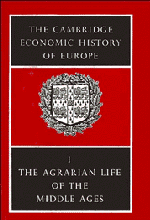Book contents
- Frontmatter
- Chapter I The Settlement and Colonization of Europe
- Chapter II Agriculture and Rural Life in the Later Roman Empire
- Chapter III The Evolution of Agricultural Technique
- Chapter IV Agrarian Institutions of the Germanic Kingdoms from the fifth to the ninth century
- Chapter V Agrarian conditions in the Byzantine Empire in the Middle Ages
- Chapter VI The Rise of Dependent Cultivation and Seignorial Institutions
- Chapter VII Medieval Agrarian Society in its Prime
- §1 France, The Low Countries, and Western Germany
- §2. Italy
- §3 Spain
- §4 The lands east of the Elbe and German colonization eastwards
- §5 Poland, Lithuania and Hungary
- §6 Russia
- §7 England
- §8 Scandinavia
- Chapter VIII Crisis: From the Middle Ages to Modern Times
- BIBLIOGRAPHIES
- Plate Section
- The Roman frontier and the Teutonic Tribes in the first and fourth centuries A.D.
- The Empire of Charles the Great
- Germany in the thirteenth century
- References
§4 - The lands east of the Elbe and German colonization eastwards
from Chapter VII - Medieval Agrarian Society in its Prime
Published online by Cambridge University Press: 28 March 2008
- Frontmatter
- Chapter I The Settlement and Colonization of Europe
- Chapter II Agriculture and Rural Life in the Later Roman Empire
- Chapter III The Evolution of Agricultural Technique
- Chapter IV Agrarian Institutions of the Germanic Kingdoms from the fifth to the ninth century
- Chapter V Agrarian conditions in the Byzantine Empire in the Middle Ages
- Chapter VI The Rise of Dependent Cultivation and Seignorial Institutions
- Chapter VII Medieval Agrarian Society in its Prime
- §1 France, The Low Countries, and Western Germany
- §2. Italy
- §3 Spain
- §4 The lands east of the Elbe and German colonization eastwards
- §5 Poland, Lithuania and Hungary
- §6 Russia
- §7 England
- §8 Scandinavia
- Chapter VIII Crisis: From the Middle Ages to Modern Times
- BIBLIOGRAPHIES
- Plate Section
- The Roman frontier and the Teutonic Tribes in the first and fourth centuries A.D.
- The Empire of Charles the Great
- Germany in the thirteenth century
- References
Summary
When the Western Slavs, from their home between the Dnieper, the Carpathians, the Bug and the Pripet marshes, percolated slowly as far as the Eastern Alps, the Saale, the Elbe and the Gulf of Kiel, into lands that Germans had abandoned, their very modest economic life corresponded with their youth as a people and the simplicity of their political and social organization. The latter had not developed beyond the stage of the patriarchal family and clan. It seems likely that such groups were also the units of economic life. For the Western Slavs this is not proved. But the legal position of these groups, and the place of the kindred in matters of inheritance among freemen at a later date, suggest their primitive economic significance. Life was still to a great degree based on the collecting economy – fishing, the gathering of wild honey, and trapping; but the Slavs brought animals with them into their new territories, at first mainly swine. They were, however, acquainted with agriculture; and its practice was encouraged by their occupation of lands which Germans had formerly tilled. But they were not numerous enough to occupy them all at once; and there must have been some reversion to woodland. They may have learnt something about the arts of daily life from the few Germans who remained behind; but no marked influence of this kind can be traced.
- Type
- Chapter
- Information
- Publisher: Cambridge University PressPrint publication year: 1966
References
- 2
- Cited by

